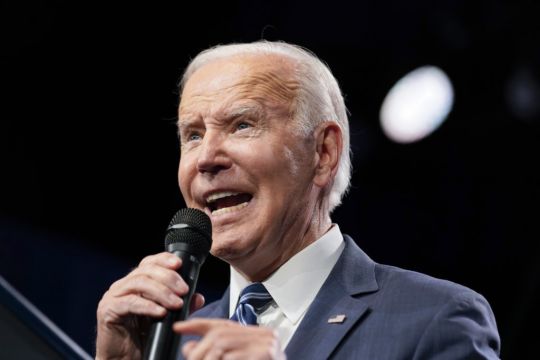A Texas judge has blocked President Joe Biden’s plan to provide millions of borrowers with up to 20,000 dollars (£17,122) apiece in federal student-loan forgiveness.
The programme was already on hold as a federal appeals court in St Louis considers a separate lawsuit by six states challenging it.
District Court Judge Mark Pittman, an appointee of former president Donald Trump based in Fort Worth, said the programme usurped Congress’ power to make laws.
“In this country, we are not ruled by an all-powerful executive with a pen and a phone. Instead, we are ruled by a Constitution that provides for three distinct and independent branches of government,” Mr Pittman wrote.
He added: “The court is not blind to the current political division in our country. But it is fundamental to the survival of our republic that the separation of powers as outlined in our Constitution be preserved.”
The debt forgiveness plan would cancel 10,000 dollars (£8,561) in student loan debt for those making less than 125,000 dollars (£107,015) or households with less than 250,000 dollars (£214,031) in income.
Pell Grant recipients, who typically demonstrate more financial need, would get an additional 10,000 dollars in debt forgiven.
The cancellation applies to federal student loans used to attend undergraduate and graduate school, along with Parent Plus loans.
More than 40 million Americans can benefit from the Biden-Harris Administration’s student debt relief plan.
Rather than easing the burden of loan debt for these borrowers, Republican officials are suing to prevent this relief.— The White House (@WhiteHouse) November 5, 2022
Advertisement
The 8th US Circuit Court of Appeals had put the forgiveness plan on hold on October 21 while it considered an effort by the states of Nebraska, Missouri, Iowa, Kansas, Arkansas and South Carolina to block the programme.
While the stay temporarily stopped the administration from actually clearing debt, the White House has encouraged borrowers to continue applying for relief, saying the court order did not prevent applications or the review of applications.
As of late October, more than 22 million borrowers had applied for debt relief.
The legal challenges have created confusion about whether borrowers who expected to have debt canceled will have to resume making payments from January 1, when a pause prompted by the Covid-19 pandemic is set to expire.
Economists worry that many people have yet to rebound financially from the pandemic, saying that if borrowers who were expecting debt cancellation are asked to make payments instead, many could fall behind on the bills and default.
The White House did not immediately provide a response to the ruling.







